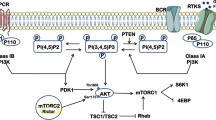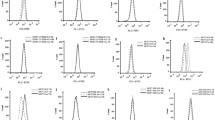Abstract
Molecular mechanisms of the influence of PI3K/Akt/PTEN/mTOR-signaling pathway on survival of tumor cells treated with cytotoxic drugs was studied using rapamycin (Rapa), mTOR specific inhibitor, and 9 human tumor cell lines of different origin and with different Akt kinase activity. Three of these cell lines were selected for drug resistance due to P-glycoprotein (Pgp or ABCB1) overexpression. Rapa inhibited phosphorylation of mTOR downstream effectors. Rapa sensitivity of the cells was Akt-dependent but did not correlate with ABCB1 overexpression. Suppression of mTOR function increased drug resistance in 8 out of 9 cell lines studied. The influence of Rapa on the ABC-transporter gene expression was examined. It was shown that in half of the cell lines studied Rapa exerted differential effects on the amount of ABC-transporter proteins: in some cases the protein amount decreased and in others, increased. The amount of mRNA remained unchanged. These data suggest that mTOR can regulate ABC transporters at the level of translation.
Similar content being viewed by others
References
Stavrovskaya, A.A., Kantserogenez (Carcinogenesis), Moscow, Meditsina, 2004, pp. 558–574.
Scherbakova, E.A., Stromskaya, T.P., Rybalkina, E.Yu., and Stavrovskaya, A.A., Influence of Human Tumor Suppressor PTEN on Sensitivity of Malignant Cells to Anticancer Drugs, Biologicheskie Membrany (Rus.), 2007, vol. 24(2), pp. 143–150.
Scherbakova, E.A., Stromskaya, T.P., Rybalkina, E.Yu., Kalita, O.V., and Stavrovskaya, A.A., Role of PTEN Protein in Multidrug Resistance of Prostate Cancer Cells, Molec. Biologia (Rus.), 2008, vol. 42(3), pp. 430–435.
Arceci, R.J., Stieglitz, K., and Bierer, B.E., Immunosuppressants FK506 and Rapamycin Function As Reversal Agents of the Multidrug Resistance Phenotype, Blood, 1992, vol. 80(6), pp. 1528–1536.
Yacyshyn, B.R., Bowen-Yacyshyn, M.B., and Pilarski, L.M., Inhibition by Rapamycin of P-Glycoprotein 170-Mediated Export from Normal Lymphocytes, Scand. J. Immunol., 1996, vol. 43(4), pp. 449–455.
Wu, C., Wangpaichitr, M., Feun, L., Kuo, M.T., Robles, C., Lampidis, T., and Savaraj, N. Overcoming Cisplatin Resistance by mTOR Inhibitor in Lung Cancer, Mol. Cancer., 2005, vol. 4(1), p. 25.
Stone, K.R., Mickey, D.D., Wunderli, H., Mickey, G.H., and Paulson, D.F., Isolation of a Human Prostate Carcinoma Cell Line (DU 145), Int. J. Cancer, 1978, vol. 21, pp. 274–281.
Kaighn, M.E., Lechner, J.F., Narayan, K.S., and Jones, L.W., Prostate Carcinoma: Tissue Culture Cell Lines, Natl. Cancer Inst. Monogr., 1978, vol. 49, pp. 17–21.
Park, S.W., Lomri, N., Simeoni, L.A., Fruehauf, J.P., and Mechetner, E., Analysis of P-Glycoprotein-Mediated Membrane Transport in Human Peripheral Blood Lymphocytes Using the UIC2 Shift Assay, Cytometry, 2003, vol. 53(2), pp. 67–78.
Akiyama, S., Fojo, A., Hanover, J.A., Pastan, I., and Gottesman, M.M., Isolation and Genetic Characterization of Human KB Cell Lines Resistant to Multiple Drugs, Somat. Cell Mol. Genet., 1985, vol. 11, pp. 117–126.
Batist, G., Tulpule, A., Sinha, B.K., Katkis, A.G., Myers, C.E., and Cowan, K.H., Overexpression of a Glutathione Transferase in Multidrug-Resistant Human Breast Cancer Cells, J. Biol. Chem., 1986, vol. 261(33), pp. 15544–15549.
Agapova, L.S., Ivanov, A.V., Sablina, A.A., Kopnin, P.B., Sokova, O.I., Chumakov, P.M., and Kopnin, B.P., P53-Dependent Effects of RAS Oncogene on Chromosome Stability and Cell Cycle Checkpoints, Oncogene, 1999, vol. 18(20), pp. 3135–3142.
Vaiman, A.V., Stronskaya, T.P., Rybalkina, E.Yu. Sorokin, A.V., Gurjanov, S.G., Zabotina, T.N., Mechetner, E.B., Ovchinnikov, L.P., and Stavrovskaya, A.A., Intracellular Localization and Content of YB-1 Protein in Multidrug Resistant Tumor Cells., Biochemistry (Moscow) (Rus.), 2006, vol. 71,(2), pp. 190–200.
Neshat, M.S., Mellinghoff, I.K., Tran, C., Stiles, B., Thomas, G., Petersen, R., Frost, P., Gibbons, J.J., Wu, H., and Sawyers, C.L., Enhanced Sensitivity of PTEN-Deficient Tumors to Inhibition of FRAP/mTOR, Proc. Natl. Acad. Sci. USA, 2001, vol. 98, pp. 10314–10319.
Grünwald, V., DeGraffenried, L., Russel, D., Friedrichs, W.E., Ray, R.B., and Hidalgo, M., Inhibitors of mTORr Reverse Doxorubicin Resistance Conferred by PTEN Status in Prostate Cancer Cells, Cancer Research, 2002, vol. 62, pp. 6141–6145.
David-Beabes, G.L., Overman, M.J., Petrofski, J.A., Campbell, P.A., de Marzo, A.M., and Nelson, W.G., Doxorubicin-Resistant Variants of Human Prostate Cancer Cell Lines DU 145, PC-3, PPC-1, and TSU-PR1: Characterization of Biochemical Determinants of Antineoplastic Drug Sensitivity, Int. J. Oncol., 2000, vol. 17, pp. 1077–1086.
Edinger, A.L., Linardic, C.A., Chiang, G.G., Thompson, C.B., and Abraham, R.T., Differential Effects of Rapamycin on Mammalian Target of Rapamycin Signaling Functions in Mammalian Cells, Cancer Research, 2003, vol. 63, pp. 8451–8460.
Vanderweele, D.J., Zhou, R., and Rudin, C.M., Akt Up-Regulation Increases Resistance to Microtubule-Directed Chemotherapeutic Agents through Mammalian Target of Rapamycin, Mol. Cancer. Ther., 2004, vol. 3(12), pp. 1605–1613.
Martelli, A.M., Tazzari, P.L., Tabellini, G., Bortul, R. Billi, A.M., Manzoli, L., Ruggeri, A., Conte, R., and Cocco, L., A New Selective Akt Pharmacological Inhibitor Reduces Resistance to Chemotherapeutic Drugs, TRAIL, All-trans-Retinoic Acid, and Ionizing Radiation of Human Leukemia Cells, Leukemia, 2003, vol. 17(9), pp. 1794–1805.
Recher, C., Beyne-Rauzy, O., Demur, C., Chicanne, G., Dos Santos, C., Mas, V.M., Benzaquen, D., Laurent, G., Huguet, F., and Payrastre, B., Antileukemic Activity of Rapamycin in Acute Myeloid Leukemia, Blood, 2005, vol. 105(6), pp. 2527–2534.
Mondesire, W.H., Jian, W., Zhang, H., Ensor, J., Hung, M.C., Mills, G.B., and Meric-Bernstam, F., Targeting Mammalian Target of Rapamycin Synergistically Enhances Chemotherapy-Induced Cytotoxicity in Breast Cancer Cells, Ensor. J. Clin. Cancer. Res., 2004, vol. 10(20), pp. 7031–7042.
Bing-Hua, Jiang and Ling-Zhi, Liu, Role of mTOR in Anticancer Drug Resistance: Perspectives for Improved Drug Treatment, Drug Resistance Updates, 2008, vol. 11, pp. 63–76.
Easton, J.B. and Houghton, P.J., mTOR and Cancer Therapy, Oncogene, 2006, vol. 25, pp. 6436–6446.
Author information
Authors and Affiliations
Corresponding author
Additional information
Original Russian Text © E.A. Scherbakova, E.Yu. Rybalkina, T.P. Stromskaya, A.A. Stavrovskaya, 2009, published in Biologicheskie Membrany, 2009, Vol. 26, No. 2, pp. 119–125.
The article was translated by the authors.
Rights and permissions
About this article
Cite this article
Scherbakova, E.A., Rybalkina, E.Y., Stromskaya, T.P. et al. Participation of mTOR in the regulation of multidrug resistance of tumor cells. Biochem. Moscow Suppl. Ser. A 3, 184–189 (2009). https://doi.org/10.1134/S1990747809020111
Received:
Published:
Issue Date:
DOI: https://doi.org/10.1134/S1990747809020111




